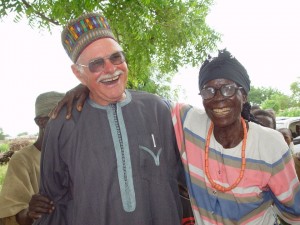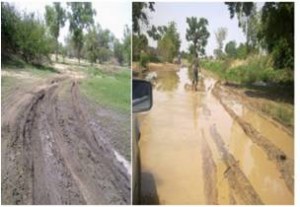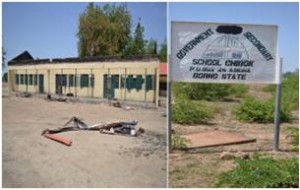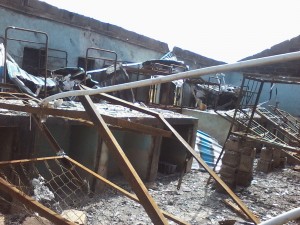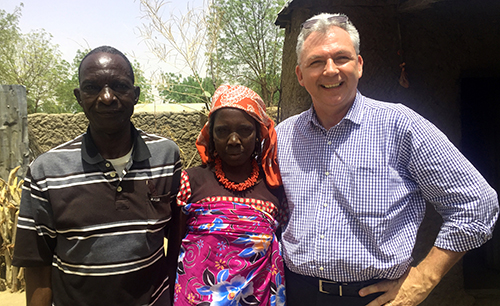
Jay Wittmeyer with Mr. and Mrs. Fafa Lawan Kapi from Chibok.
Photo by Marcus Gamache
By Jay Wittmeyer, executive director of Global Mission and Service
As executive director of Global Mission and Service, my responsibilities include strengthening relationships with our sister churches in other parts of the world. I recently returned from a trip to be with the Nigerian Brethren as they convened their 70th Majalisa (annual conference).
This conference was particularly significant for the Nigerian Brethren as they returned home after two years of displacement and exile. There have been ongoing efforts to de-Christianize the historic homeland of Ekklesiyar Yan’uwa a Nigeria (EYN), and the Brethren counted it a tremendous blessing to be present in Kwarhi. To celebrate this and to express gratitude to the Church of the Brethren for assisting EYN through their time suffering, leadership invited me to participate in the Majalisa and deliver the opening sermon.
Among those present at the Majalisa were the governor of Adamawa State, who gave a speech, and his entourage. In response, EYN president Joel Billi shared. “We request a place. Our people have lived here for centuries,” he said, “and we want to continue to live here. We do not want to go anywhere else.”
Going to Nigeria also allowed me to visit Chibok for the first time. Chibok is about an hour from Kwarhi. The paved road finishes miles before Chibok and the remaining stretch is gravel with deep potholes. Chibok is noticeably drier than many areas and extremely dry in April.
The Brethren established a missionary presence in Chibok in the 1930s, started a school, and even established a Bible school. (To my amazement, I learned that the Bible school still holds classes and currently has 13 students.) Long-term mission worker Gerald Neher wrote several books focused on his time in Chibok.
Despite its deep Brethren roots, however, Chibok became known internationally on April 14, 2014, when the radical sect Boko Haram drove dozens of heavily armed vehicles into the compound of the Government Girls Secondary School and forcefully abducted 276 girls. This prompted international outrage, reflected in the #BringBackOurGirls campaign. (Our prayers continue for these girls.)
The Nigerian security forces have a heavy presence in Chibok. But since I was traveling with Paul Yang, EYN district secretary, we were given permission to enter the town, visit EYN churches and the Bible school, and meet with EYN families. What had a significant impact on me in Chibok was seeing the youth brigades practice their marching. They are tasked to assist in patrolling the community and to alert the security forces of any attacks.
It was inspiring to meet Laban Wadi, an EYN member who, despite the attacks, decided he and his family should stay in Chibok. They were forced to flee and spend eight nights in the bush, but otherwise have been safe living in the town while others on the outskirts had to flee. Laban retired as a medical assistant, a trade he learned from the Brethren. He expressed gratitude for my visit and asked me to bring greetings to Brethren in the United States. He mentioned Roger Schrock, Owen Shankster, and Roger Ingold, and was saddened to learn that Gerald Neher passed away last year. Laban was baptized by Gerald in 1958. Laban also reported that the last rainy season was good and he harvested 30 bags of peanuts alone.
On our way back from Chibok, we stopped to see the church in Uba. When Boko Haram attacked the area in 2014, they went from town to town burning churches by the hundreds. EYN lost 250 large churches, and the church at Uba was among them. The congregation is now meeting under a temporary structure as it works to raise funds to rebuild. Several thousand members attend worship every week and the footprint of the new church is very large. It will not have wooden rafters and will not be easily burned.
When you give to the Church of the Brethren, you support new and ongoing partnerships around the world. Your prayers and financial contributions make it possible for relationships to grow and communities to thrive through the partnerships of Global Mission and Service. We are so thankful for your support of this important, life-changing ministry of the Church of the Brethren.
Learn more about the work of Global Mission and Service at www.brethren.org/global. Support this and all of the ministries of the Church of the Brethren today at www.brethren.org/give.



